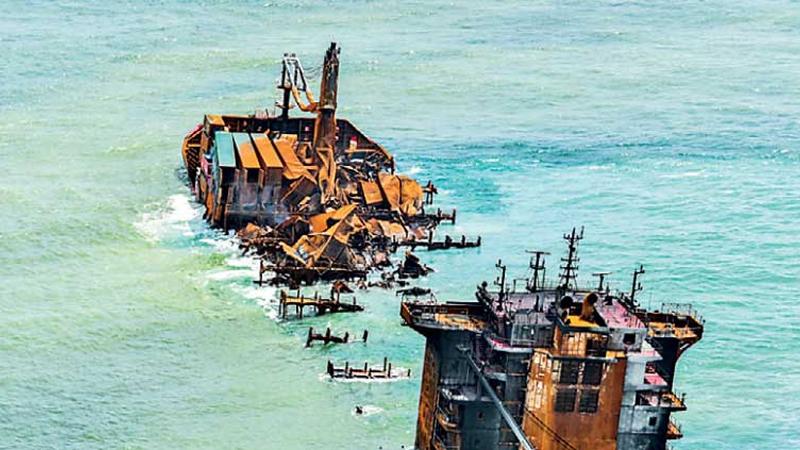
The Sri Lanka Shippers’ Council (SLSC) wants a thorough and impartial investigation into the MV X-Press Pearl catastrophe keeping politics and geopolitics aside to ensure justice prevails, Sri Lanka Shippers’ Council Chairman Suren Abeysekera told the Sunday Observer Business on Friday.
He said the investigations should cover all aspects pertaining to the incident i.e. from exporter cargo declaration, origin port functions, responses and responsibilities of ports en route, duties executed by the ship captain and crew, its principal office response, local ship agent’s conduct and local authority communications and action taken during the incident to accurately understand where lapses have taken place resulting in the disaster. The Council notes that pertinent authorities such as the Director General of Merchant Shipping should exercise its powers swiftly and take immediate remedial action on these pressing matters to curb damages.
On the impact to shippers, Abeysekera said the ship was carrying many imports to the country including raw materials for the apparel industry and other sectors’ imports that got affected and engulfed in the fire.
However, so far there have been no reports of considerable delays in other vessel operations or imports due to the fire, he said adding that the industry may experience additional delays in future due to stringent checks that may have to be in place by the Harbour Master and or Sri Lanka Port’s Authority (SLPA) before authorising ships to enter Colombo port increasing congestion and delaying ships’ operations. Around 1,500 containers being destroyed in the vessel can have a short to midterm scarcity of empty containers in South Asia - which is currently experiencing a severe shortage of empty containers for export owing to Covid-19 effects.
The loss of these containers will then attract additional costs in terms of having to reposition empty containers from other regions to fulfill export needs, Abeysekera said, adding that with frequent incidents in and around Sri Lanka, the premiums that need to be paid as cargo insurance by shippers could increase.
This will then have other ripple effects such as price increase in commodity goods resulting in inflation and export manufacturing cost increase hence reducing our export competitiveness globally.
He said another macro effect could be the higher number of maritime insurance claims driving increases in insurance premia for vessels (implemented by P&I clubs) calling Colombo which then would obviously be passed down to shippers increasing already very high shipping rates further.
The head of the Council said that considering the catastrophe at hand, there is a dire need for authorities and SLPA to be better prepared with equipment and know-how to manage ship fires of this nature particularly owing to Sri Lanka being a busy transshipment port (within the first 25 in terms of volumes globally).
Of course, the cost of upgrading infrastructure and increasing maintenance cost will drive operational cost escalation but a mechanism should be in place where the importer and exporter will not have to bear these increases finally.
He said if Sri Lanka is to reach its aspiration to become the maritime hub of South Asia using its unique strategic location, the maritime industry needs to upgrade its salvage and other connected services required to support distressed ships that pass by the island on a daily basis. If not, we become less attractive to the international shipping networks in terms of developing Colombo as a hub port.
The role of ship agents in Sri Lanka should also be reviewed. Considering they are representing international shipping lines in the country and compensated for handling containers including transshipment, have they taken adequate proactive measures including investments made to ensure the safety of their principles’ ships and the cargo they carry as imports and exports to and from the island? What additional steps could be taken to collaborate more with the authorities to upgrade infrastructure to handle modern box ship/ ultra large vessel emergencies?
The International Maritime Organisation’s IMDG Code has clear guidelines to handle these types of cargo and incidents, Abeysekera said.
However, he said the resolutions and international laws ratified need to be locally included appropriately in country legislation for it to be considered as the law of the land.
Experts point out that some of the resolutions ratified internationally are not adequately passed in Sri Lankan legislation which may be a hindrance to suitably argue these cases in the island should the need arise.
The SLSC proposes that the Sri Lankan authorities implement an ‘Advance Manifest Submission’ system for all cargo arriving to Colombo port including for transshipment before the ship sails origin ports similar to all developed countries and major ports to assess risk before allowing ships to enter its waters.
